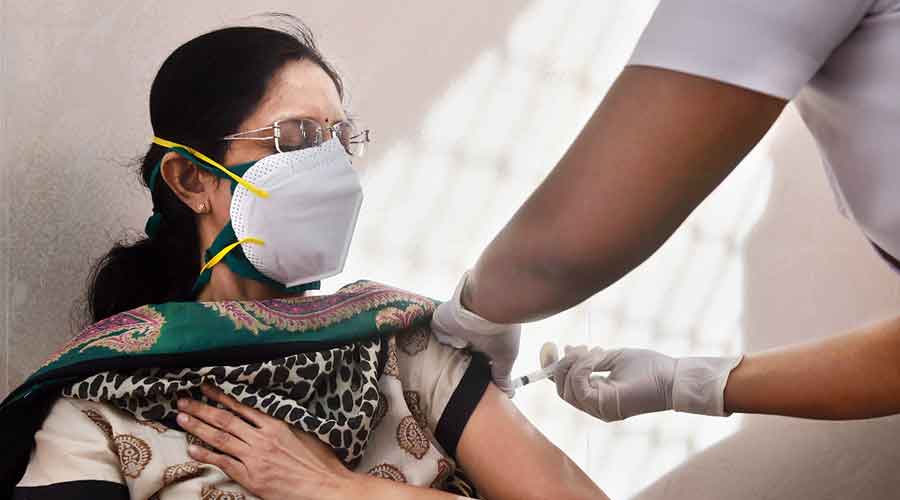⚫I have taken a Covid vaccine and so have hundreds of others. Nothing untoward has happened to any of us. So, it’s safe for you, too.
⚫We have all treatment facilities at the hospital. If you fall sick after taking a vaccine dose, we can take care of you.
⚫Since you are a government employee who has to take part in public interactions, it’s your duty to take a vaccine to keep yourself as well as those who come in contact with you safe.
In the absence of much knowledge about possible adverse reactions and efficacy of Covid-19 vaccines, these are the only words of motivation used by the authorities at various hospitals across Bengal to motivate potential recipients who are still reluctant to take a dose.
Doctors and public health experts said they were unable to answer a lot of queries in the absence of enough data.
The Centre has said all health-care workers should be given the first dose of a Covid-19 vaccine by February 20. Till Thursday (February 18), only about 80 per cent of the health-care workers were inoculated.
A doctor at a private hospital was suffering from herpes infection on the day he was to get a shot. Another doctor at the hospital, who counsels potential recipients, said he had no idea whether someone suffering from herpes could take a Covid vaccine. So he advised his colleague to defer the vaccination.
Several others said that in the absence of guidelines, they were asking potential recipients to defer the vaccination when faced with similar situations.
“The health ministry has issued guidelines for Covid vaccination. But many recipients are approaching us with situations that are not covered by the guidelines or during the training sessions. In such cases, we are not taking chances and are asking them not to take the shots for the time being,” the CEO of a private hospital said.
Some doctors who are counselling colleagues to take vaccines said they were banking on clinical judgements to answer many queries.
“There are a lot of unexpected situations which the guidelines do not mention. Someone with a health condition is asking whether he can take a Covid vaccine. We are using our clinical judgement to guide such persons but in most cases we are advising them to delay the vaccination,” infectious disease expert Chandramouli Bhattacharya said.
“For some people who are on long-term significant immunosuppressive drugs, it is better to delay the vaccination if the treating doctor says the dosage of the drugs will be reduced soon. Because otherwise, the vaccine might not be very effective,” he said.
At a meeting on Friday, chief secretary Alapan Bandyopadhyay asked senior officials of the health department to increase the number of vaccination sites and ensure that all potential recipients get to know about their vaccination date and time.
“The chief secretary asked us to ensure that everyone gets the communication about the vaccination date and time. He stressed the need to send the message to all healthcare workers that they have to get the first dose of a vacc-ine by February 25,” said an official of the health department.
“Opening more vaccination sites will mean taking the inoculation closer to a health-care worker’s home,” the official said.
Officials, however, pointed out that there were already enough sites in most districts. Two officials said Calcutta and North 24-Parganas have 70 sites each and they felt the numbers were quite high.
“There are many sites where the number of people turning up is much lower compared with the targeted figure,” said an official.
The reluctance among a section of recipients to take the shots and lethargy among those who are administering them were the two factors responsible for the slow pace.
Lack of enough data about the efficacy of Covaxin (one of the two vaccines approved for emergency use in India, the other being Covishield) is one major reason for the reluctance.
According to health department officials, out of more than 6.5 lakh doses administered, only 26,500 were of Covaxin.
On Friday, only about 60 per cent of the targeted vaccine doses could be administered.
“Many recipients do not want to take Covaxin. Also, there is a lot of documentation involved, including signing a consent form. All these are preventing Covaxin numbers from going up,” said a health department official.











